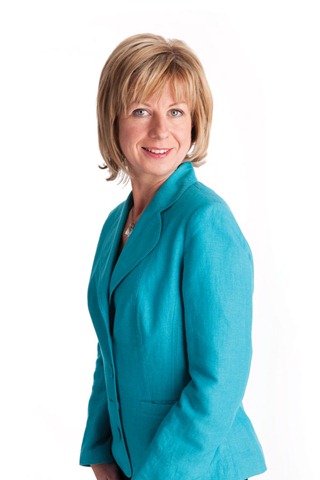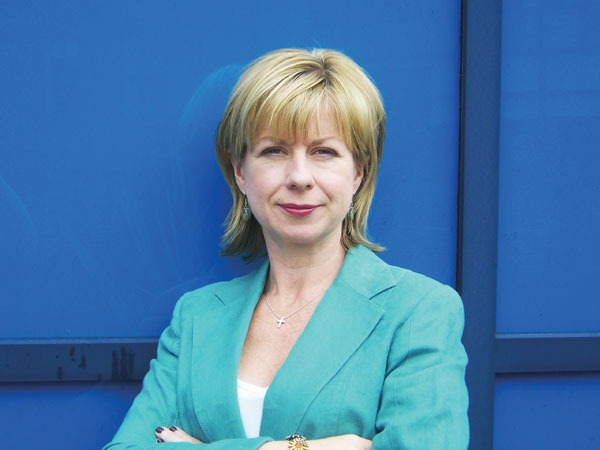Marie-Louise Connolly
BBC Northern Ireland’s Health Correspondent, Marie-Louise Connolly, has been at the corporation since 1992 and took on the health role in April 2009. After completing a degree in politics at Queen’s University, she studied a masters in journalism at Dublin City University. Work experience on the Sunday Sequence programme and a Texas radio station fuelled her passion for journalism and she has covered many memorable events since then.
How did you get started in journalism?
When I was a child growing up, I was always aware of the radio being on in the kitchen. My parents, though not in the business were both news junkies. If they weren’t tuned in, there was usually a copy of the daily newspaper lying on the kitchen table. So from an early age, I was aware of what was making the headlines and I asked lots of questions.
A career in journalism wouldn’t have been the obvious choice for a pupil at St Dominic’s High School on the Falls Road. I remember the careers teacher suggesting that I do speech therapy instead. I wrestled with that idea for a while, and on her advice kept my options open by studying politics at Queen’s University Belfast. However, after spending a few Sunday mornings on work experience on the BBC’s Sunday Sequence programme, collecting the newspapers and making tea, I caught the bug.
One particular day sticks in my mind. It was Sunday, February the 11th, 1990. The editor of the programme, Martin O’Brien, who is still at the helm, asked me to dial a certain international telephone number and not to stop until someone picked up. Several hours later, on a very crackly line, a voice said: “Hello this is Victor Verster Prison.” Nelson Mandela had just been released, and within minutes a prison guard was speaking live on BBC Radio Ulster. While at Queen’s University, I wrote for ‘Gown’, the university newspaper which launched many a young journo’s career. From Queen’s, I went to Dublin City University where I studied for a masters in journalism. A brief spell followed on a Texas radio station. In 1992 I joined the BBC as their regional news trainee. And as the saying goes … the rest is history.
What made you decide to specialise in health reporting?
I have always enjoyed talking to people and hearing their stories. In Northern Ireland, we love nattering about what is wrong with us.
Whether it is on the bus, or picking up the children in the school playground, you can be sure to hear someone pontificating, if not about their own ailments but about the woman’s down the street.
Over the years, health has never been off the news agenda. Hospital closures, maternity services amalgamating, improved procedures for cancer survivors, domestic violence, anorexia, autism – a whole range of issues, often controversial and always challenging.
So, as a reporter working on the Good Morning Ulster programme, I always opted for the health story. Then the challenge began, in those days usually with the help of a phone book, of trying to find that person to talk to me.
What is unique about covering health?
Rarely a day goes past when health isn’t on the news agenda. Stories can be about health policy at Stormont or about a child who has received a life-saving operation.
Every day is different and totally unpredictable. In fact, as I discovered only a few weeks into the role as Health Correspondent, one minute you can be reporting on free prescriptions and the next minute you are talking live on air about a swine flu pandemic.
In your opinion, what are the three most important issues facing the health sector in the coming year?
Cuts, waiting lists and health sector jobs. At a Health Committee meeting, Sean Donaghy, the Finance Director at the Department of Health, said he didn’t want to forecast what might lie ahead – as he didn’t want to frighten people.
If the health budget isn’t ring-fenced, it could be cut by a quarter. Without a doubt, that will impact massively on services.
For example, while a strict moratorium on the use of agency, locum and overtime is already in place, if further cuts come down the line posts will not be filled and therefore fewer health professionals will be available to treat patients. Mental health provision will automatically take a hit, waiting lists will soar even more and that will impact on the economy when people aren’t fit enough to work.
Are there any stories you covered throughout your career you thought were particularly memorable?
Every once in a while you meet and interview someone who leaves an indelible imprint on your life.
In 2008, I had the pleasure of meeting the Conlon sisters. With a history of breast cancer in the family they decided to be tested for the BRACCA 1 cancer gene. Four sisters tested positive and went on to have their breasts, ovaries and fallopian tubes removed, everything that on the inside makes them a woman. These women were amazing. Their glass was always half full. They taught me to try and see the positive and that family should always come first. Despite the tears shed, we had some great laughs. It was one of those bittersweet stories.
I covered the McElhill family tragedy in Omagh. I will never forget arriving on the scene and describing on the Radio Ulster Talkback programme what I saw and smelt. It was a scene of complete devastation. A family wiped out.
On a more uplifting note, I covered President Bill Clinton’s visit to Enniskillen. Walking out of the newsroom that morning, the news editor bet that I couldn’t get an interview with the man himself. Mingling in the crowd, I caught his eye, side-stepped the minders, stuck my microphone towards him, crossed my fingers and asked a few questions. He replied and even smiled with those piercing blue eyes. That was a scoop!
What are the job’s main challenges and rewards?
As well as covering every angle of the story, working in the BBC means having to cover every media outlet as well. As a journalist and correspondent I am expected to file for the radio and television bulletins, current affairs programmes starting with Good Morning Ulster right through to Evening Extra and Newsline 6.30 and BBC Online.
Sometimes it can take days even weeks to secure an interview. When it airs there is a real sense of ‘yes!’ Northern Ireland is such a small place. It’s not unknown for a Minister to hear a story or interview and for it to influence policy – such as suicide and anorexia. Now that is rewarding.
How do you like to spend your time outside work?
My two children, Niamh who is 10 and six-year-old Rory, keep me busy. I enjoy trying out new restaurants with friends and putting the world to right over good food and wine. I enjoy running. The aim is to be fit enough to sign up for a 10k run soon. Life is really good when the family escapes to our favourite hide-away in Donegal. A combination of walking on the beach and fresh air is usually just what the doctor ordered!






